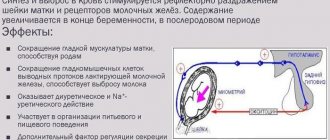Home / Newborn / What should parents do if their newborn’s stomach hurts?
30361
0
Pediatricians hear complaints that a newborn's stomach hurts quite often. Almost half of parents and their children experience this disease. Discomfort and painful spasms that disrupt the sleep of the entire family are sometimes observed almost every night until the baby is 2-4 months old.
In such a situation, the main thing is to remain calm. Remember that this won't go on forever. It is important to realize that your baby is in pain and scared, he is also tired of the exhausting pain and wants to sleep. Try to be patient and help your baby get through this difficult period in his life.
Natural physiology
To begin with, it should be said that all children, without exception, suffer from abdominal pain. It’s just that in some infants this problem is more pronounced, in others it is less. But there can be several causes of pain. The most common culprits of a newborn’s poor health are:
- flatulence;
- spasm;
- volvulus (intestinal obstruction).
The first two problems are caused by completely different factors. We will look at the main ones in more detail later. Most of these factors are not that difficult to eliminate. Treatment takes place at home after consultation with a pediatrician. But volvulus is a life-threatening condition. Its symptoms may include vomiting, fever, constipation and bloating with difficulty passing gases or their complete absence, often mucous diarrhea mixed with blood clots. If you observe any of these signs, you should urgently seek help from a medical facility to prevent a tragedy. Only timely surgical intervention will help save the baby’s life!
Main causes and defining symptoms
At the first complaints of abdominal discomfort, you need to listen to the child and try to determine the cause. If you do not have medical skills, immediately call an ambulance. Only doctors can determine the exact cause.
When we call an ambulance:
- The child is less than 5 years old, the pain lasts for almost 3 hours. Accompanying with tears, whims.
- A rash appeared on the skin, the pain became unbearable.
- Diarrhea, vomiting, nausea, refusal to eat.
- Increased body temperature.
- The location of the pain is in the navel area.
- Complete refusal of food and water.
- I was injured and started to feel pain.
- Weakness, loss of consciousness.
- The pain began to appear at night, the child cannot go to the toilet.
- The pain has not stopped for almost 2 weeks, sudden weight loss.
These are the main reasons to call an ambulance. Don't wait until 2 weeks for your child to start losing consciousness. In case of prolonged pain, immediately contact a specialist or call a doctor.
What assistance should be provided to the child before the arrival of doctors?
While the parent is waiting for the ambulance, first aid will be required. Pain can occur in both children and teenagers. Help is provided based on complaints and symptoms.
Basic principles of first aid:
- If parents do not have medical education, it is better to protect them from medications until doctors arrive.
- Provide plenty of fluids; feeding is prohibited. Drink – still water, saline solution, you can’t drink juices, soda, milk.
- Monitor body temperature; if it rises, give a tablet to lower the temperature.
- You should not warm the sore spot. Hot water bottles are prohibited. This can worsen the condition and provoke inflammation.
- If parents are sure that this is normal bloating, it is permissible to give medicine that relieves spasms.
- If constipation has developed, it is better not to do an enema until a complete diagnosis by a doctor.
- When sharp pain, vomiting, and watery stools appear, the main signs of an intestinal infection are noted.
Before the ambulance arrives, parents can provide the necessary assistance to their children. But qualified medical care will only be provided in a hospital. Don't delay calling a doctor.
All will pass?
If a newborn’s tummy hurts due to spasms or colic, he needs proper care and preventive measures that will help, if not completely eliminate the child’s discomfort, then at least reduce it to a minimum.
Usually, problems with gases in children do not begin immediately after birth, but only two to three weeks after birth.
The development of the gastrointestinal tract occurs differently for everyone; in many ways, the successful course of the process depends on the method of feeding the baby. Children who are on natural (breast) nutrition quickly receive microflora useful for their body from their mother, while the number of pathogenic microorganisms in them is significantly lower than in those who eat formula from a bottle. In this regard, the tummy is more likely to hurt in a newborn who is fed artificially.
As a rule, if nothing prevents the baby’s body from adapting to its new environment, then by three to four months of its existence, the child and his parents will forget about colic and abdominal cramps. Problems such as dysbiosis, infections, lactase deficiency, poor motility and associated constipation can delay the development of the gastrointestinal tract. All these factors contribute to the accumulation of gases, causing discomfort in the child’s intestines.
Causes of abdominal pain in infants
When a boy or girl is born, he or she first encounters many stimuli. For a sterile body, everything is new, the organs learn to function normally on their own, without the support of the mother, so there are many reasons for discomfort and pain. Many situations can upset, irritate, and cause pain.
Features of physiology
Up to 6 months, the baby’s body adapts to new conditions. The respiratory, digestive, and blood supply organs “learn” to meet the needs of the growing baby, and intestinal problems arise especially often.
| Cause | Body reaction | How to fix |
| Air swallowed during sucking | Too greedy absorption of mother's milk or formula leads to the swallowing of air, which enters the stomach and begins to burst the walls, causing pain. | When breastfeeding, you should make sure that the mother attaches the baby correctly, and when artificially feeding, you should make sure that the nipple and the hole in it are not too big or small. |
| Microflora | The lack of beneficial microflora in the intestines affects the processes of assimilation and digestion. Its composition changes constantly from the moment of birth, which can cause discomfort. | Mother's milk is best suited for the first months of a baby's life; breastfeeding reduces the risk of colic to a minimum if the mother eats properly. |
| Muscle tone | In the process of digestion and improvement of intestinal motility, muscles play an important role. Weak tone can cause constipation, strong tone can cause a gag reflex. | The correct position during and after feeding, massage, stroking the tummy and back will help the baby’s intestines cope with the difficulties of the first weeks of life (we recommend reading: how to massage the tummy with colic in a newborn: video). |
| Feeding mode | Adhering to the schedule, mothers do not understand that the child may not have time to get hungry or, conversely, feel the desire to eat much earlier than the prescribed time. Both situations do not bode well. A hungry newborn will gasp for air or eat too much, which will cause discomfort in the tummy. And a child who is not hungry will become capricious and eat poorly, which will also negatively affect his well-being. | You should not rely on the schedule as a panacea for all ills. You should be guided by the needs of the child, your observations, and not methodological developments, many of which are long outdated |
| Enzymes | The absence or deficiency of enzymes in the intestines and stomach of the baby, necessary for the digestion and absorption of nutrients, can lead to flatulence. Children often regurgitate food and suffer from fermentation processes. | Breastfeeding and patience - gradually everything will return to normal, the body will cope with the problems on its own. |
Every mother knows that a newborn is not only positive and inspiring emotions. Motherhood is a huge job, which consists of overcoming simple everyday problems, and the need to care for the baby almost around the clock, comfort it, and teach it to live in a new world. Physiological problems will very quickly become a thing of the past - it is important at this time not to destroy your connection with the baby, patiently and gently helping him.
Pathological conditions
What else causes pain in a baby’s tummy? There are a number of reasons, not just physiological. Be sure to rule out pathological conditions to protect your child from complications:
- Allergy when introducing complementary foods or changing the mother's diet. The baby's body may react negatively: intestinal upset, rash on the body, itching, runny nose, lacrimation. The introduction of any products should begin with minimal doses, especially with a hereditary predisposition to autoimmune reactions.
- Constipation can occur if the newborn does not have enough fluids. Mom may have milk that is too fatty or the formula for feeding the artificial baby is incorrectly selected.
- Infectious diseases - even babies are not immune from dysentery, “stomach flu” and other intestinal infections. Only careful adherence to hygiene rules, breastfeeding or freshly prepared formula, and limiting communication with strangers can protect the baby from illness.
- Intestinal obstruction - severe abdominal pain can be caused by pathologies of the digestive system. Volvulus, tumors, and developmental anomalies should be excluded by undergoing all the necessary examinations.
When a baby screams and cries from tummy pain, you need to call a doctor. Conditions requiring immediate assistance include:
- increased body temperature;
- a rash appeared on the body;
- the child refuses to eat;
- the color of the skin has changed;
- frequent and loose stools, unusual color, bad smell;
- there was no stool for up to 3 days;
- the baby looks apathetic and lethargic.
Mothers need to be very careful not to endanger the life of their child. Doctors are ready to listen carefully, order all the necessary tests and provide assistance to the baby.
Thrush and tummy pain
Often mothers notice a thick white coating in the mouths of their babies. It can cover only the tongue or move further - to the gums, cheeks, and settle on the palate. The cause of this plaque is a fungus of the genus Candida, which is popularly called thrush. At first glance, there is nothing wrong with this, the body with a strong immune system should cope with the disease itself, but until the moment of recovery comes, the child will feel discomfort, because the fungus provokes fermentation in the gastrointestinal tract.
This causes the baby to experience increased gas production, bloating and colic. So, when a newborn’s tummy hurts due to thrush, what should you do? If the degree of damage is small, you can wipe the mouth alternately with a solution of soda (1 teaspoon of soda per 1 glass of warm boiled water) and vitamin B12. The procedure is carried out after meals for several days. But sometimes such measures do not bring the desired result and thrush does not go away completely or quickly returns. In this case, you need to show the baby to the pediatrician, and he will prescribe an antifungal drug that is acceptable for use in children.
Constipation
Another common cause of a hard tummy is constipation. They manifest themselves in stool retention. The baby does not defecate for 2-3 days, and the stool that comes out is hard, the baby grunts, turns red and bends over from painful sensations.
There are safe remedies for eliminating constipation in infants, but in order to completely cure the baby, you first need to find the cause of the disease
In medicine, there is also such a thing as physiological constipation in breastfed children, when, along with the absence of stool for 3 days, the child feels quite normal, and the process of defecation itself does not cause difficulties. Such “going to the toilet” is considered the norm and a sign that breast milk is almost completely absorbed by the body, without “waste production”.
How to help
If help is still needed, you can give the baby a glycerin suppository, a Microlax microenema, or give lactulose-based medications. But all these actions only temporarily eliminate constipation as a symptom. To fully cope with the problem, it is important to establish the reasons for delayed bowel movements:
- mother's poor diet;
- imbalance of the baby's intestinal microflora;
- switching to another formula, starting complementary feeding;
- lack of fluid intake into the body;
- diseases associated with neurology.
If you understand the cause of constipation, treatment will be more effective and comprehensive.
So, a hard belly can be a consequence of infant colic or constipation, which is easy to treat, or it can indicate a disease that requires urgent action. Listen to your child. Any unusual crying against the background of lumps in the tummy should alert you. And don’t be afraid to call an ambulance again, even if this call turns out to be false. Remember: you have been entrusted with someone else’s life, which must be protected in every possible way.
How does constipation affect the well-being of a newborn?
Constipation is another common cause of tummy pain in children. A newborn baby may not have a bowel movement for several days, and this is considered one of the normal options. But only if he does not feel discomfort. If it is difficult for a child to defecate, he cannot do it himself, and the mother has to give him a gas tube, a glycerin suppository or an enema, which means that it is necessary to adjust the baby’s diet.
Children who are bottle-fed especially often suffer from constipation. If such a problem occurs, you can try changing the mixture; it wouldn’t hurt to add a drink (water, dill water, chamomile tea) to the child’s diet.
How does a child become aware of his or her body?
After nine months of development in the womb, your baby is ready to be born. This means that his organs and systems are formed to such a level that allows the baby to exist and function independently. But is the connection between mother and child interrupted after birth?
During the first weeks, the newborn does not yet realize at all that he is now a separate person. He just has to understand what he is! In the meantime, the baby continues to feel one with the mother. He needs to constantly feel your presence nearby.
The baby does not know that he has a body, arms and legs. He acts instinctively, using only unconditioned reflexes. And his mother remains a source of essential vital substances and comfortable sensations for him. Read the article about what a 1 month old baby should be able to do?>>>
Incorrect chest grip
But children who are breastfed often face another problem - swallowing air during sucking. In the first weeks after birth, lactation is just getting better, there is a lot of milk in the breast, and the baby may not be able to swallow it. Therefore, he eats restlessly, often breaks away from the nipple and gasps for air in his mouth. If you do not lift the child in time to help him burp, this air will bother him and cause pain in the tummy. When the baby learns to properly grasp the areola of the breast and suck milk evenly, it will be much easier to cope with this problem.
What to do if your newborn’s tummy hurts after breastfeeding
A nursing mother should pay attention to her own diet.
If a newborn suffers from abdominal pain after breastfeeding, then the nursing mother should pay attention to her own diet . Perhaps she eats foods that are harmful to the baby and cause increased gas production.
Prohibited Products
All types of baked goods are prohibited products during lactation.
The list of prohibited foods during lactation includes:
- all types of baked goods and confectionery;
- legume crops (soybeans, beans, peas);
- chocolate candies;
- highly carbonated drinks, especially sweet ones;
- White cabbage;
- black bread;
- salted and pickled vegetables.
If the cause of pain in the baby’s tummy was the malnutrition of the nursing mother, then after eliminating harmful foods from the menu, this problem will most likely disappear in a few days.
Are anti-colic bottles effective?
Artificial babies may also suffer from swallowing air while eating, but their mother can help them by simply replacing the regular bottle with a special anti-colic bottle. According to the manufacturers of such utensils, the nipple of such a bottle is equipped with a pressure equalizing system that prevents air from entering the silicone cap, and it is completely filled with milk or formula.
Assistants
Modern parents can be advised to use various devices to carry their baby.
: This can be either a kangaroo for newborns or a sling.
These devices not only allow the child to move as much as possible at his age, but also reduce the load on the mother’s arms and spine. By kicking his legs, the baby gets rid of excess gases and air bubbles
accumulated in his intestines.
To help her baby survive this difficult stage in his life, each mother must find an individual solution and independently decide what to do if he has a tummy ache.
All methods and methods of treatment outlined in the article, as well as medications mentioned in the article, are indicated as recommendations and advice.
Before using them, you must consult your doctor.
and receive a prescription and plan for their use. The site is not a source of medical advice.
Find out right now
For colic, constipation, bloating, regurgitation and to normalize digestion.
Is it possible to help the baby by refusing to eat?
Thus, we almost figured out why newborns have a tummy ache, but we missed one of the questions that interests the vast majority of nursing mothers - diet. Recent studies by pediatricians from around the world prove that there is virtually no relationship between what a woman eats and the formation of gas in her child. In many Western countries, mothers are allowed to eat whatever they are used to. That is, they do not need to limit themselves to healthy foods - meat, fresh vegetables and fruits, dairy products and even sweets. The only foods that are forbidden are those that cause allergic reactions and various harmful foods that are undesirable for everyone without exception:
- alcohol;
- carbonated drinks with sugar;
- energy;
- fast food;
- fried, fatty and overly spicy foods.
Of course, you can experiment with your diet. After all, a short-term refusal of whole milk or legumes has never killed anyone, but, unfortunately, even after eliminating from the diet all foods that could theoretically cause bloating, mothers see their newborn babies have a tummy ache. What to do if the diet does not help, but there are no other obvious symptoms of the disease (constipation, diarrhea, etc.)?
First aid
If abdominal pain appears, you need to put the child on his back; if there is vomiting, he needs to turn his head to the side, bend his knees, slowly stroke the stomach clockwise - this position will help relieve spasm and reduce the manifestation of pain.
What to do if your child has a stomach ache
- Visit a doctor, take a general blood test, urine test, stool test, do an ultrasound, MRI, and x-ray of the abdominal organs. Colonoscopy, irrigoscopy, FGS are mandatory diagnostic methods for suspected gastrointestinal pathology.
- Give the child a painkiller based on paracetamol, ibuprofen, antispasmodics No-Shpa (Drotaverine) help well. But resort to medication only in extreme cases, medications blur the clinical picture, and it will be difficult for the doctor to quickly establish a diagnosis.
- In case of severe vomiting, diarrhea, or fever, the main task of parents is to avoid dehydration. Give your child small portions of water every 5 minutes, even by force; it is better to use Regidron, Oralit, or regular water without gas.
What not to do if you have stomach pain
Don't be too quick to apply heat. If the discomfort is caused by an attack of appendicitis or other infectious pathologies, then any warming procedures will only worsen the situation; cold compresses also cannot be applied without preliminary diagnosis.
It is forbidden to wash or try to feed the baby. If you have diarrhea and vomiting, you do not need to immediately give medications to eliminate these symptoms - this is how the body tries to cleanse itself of toxins.
If abdominal pain is localized in the navel area, then parents can try to help themselves as follows:
- put your child on a diet, eliminating foods that you suspect could cause the problem;
- Give your child plenty of non-carbonated water or special oral rehydration products;
- If your baby has excessive gas formation, you can help him by giving him the drug simethicone.
At first, provide your baby with rest and quiet, as well as dietary nutrition that will restore strength and normal functioning of the gastrointestinal tract. Make sure that vomiting does not recur.
If a child has a tummy ache due to impaired digestion, parents need to carefully monitor their child’s diet: exclude all gas-forming foods from the menu (milk, pickles, beans, bread, kvass, mushrooms), supplement it with fiber.
What to do if an acute abdomen occurs? First aid for stomach pain is to call an ambulance. Only a doctor can determine the cause of acute pain and select the appropriate treatment.
Before the ambulance arrives, you are only allowed to apply an ice pack to the baby’s stomach to alleviate his condition.
Rescue physical education
The most accessible, harmless and proven way to help a child is physical activity. Due to his age and insufficient development, the baby cannot fully move. All his activities are limited to chaotic waving of his arms and legs. When a child suffers from pain, he tries to help himself - he presses his legs to his tummy. But if the spasm is strong or the gases accumulated in the intestines have formed too large bubbles, it will be difficult for him to get rid of them in this way.
What to do then? How to help? A newborn's tummy hurts usually in the evening. To sleep peacefully throughout the night, the mother must work with the baby throughout the day. While awake, you need to lay it on your tummy, do physical exercises, massage, light gymnastics, including on a ball.
How to determine colic in a boy
Crying is the only way a newborn can tell adults that something is bothering him. But the baby does not always cry because of tummy pain. Sometimes, to calm him down, it is enough to feed the child or change his diaper. So how can a mother understand that the baby is suffering from colic?
The baby does not always cry because of tummy pain.
There are several specific symptoms that can be used to identify colic in a newborn.
- The child kicks his legs , bends them and tries to pull them towards his tummy.
- The baby's face turns completely or partially red .
- When crying, the newborn arches his back .
- The baby's tummy swells and becomes hard and dense to the touch .
- The child begins to cry for no apparent reason and just as suddenly calms down.
If colic is accompanied by diarrhea, vomiting or fever, you should immediately seek help from a pediatrician.
Until how many months do newborn boys suffer from colic?
As a rule, colic is a relatively short-term phenomenon and usually lasts for the first three months of the baby's life.
Colic is a relatively short-term phenomenon.
Colic begins in infants who have reached two weeks of age , because it is during this period that the mother’s protective hormones are finally removed from the child’s body.
The duration of colic depends on the individual characteristics of each baby’s body. In some children, the gastrointestinal system returns to normal already in the second month of life , while other babies may suffer from attacks of abdominal pain until three or four months .
Many mothers are interested in the question of how long colic lasts in small children. The intensity and duration of colic also depend on the physiological characteristics of each infant. Typically, attacks can last from three to six hours.
There is an opinion that babies who were born before their due date are more likely to suffer from colic.
Medications
There are several types of medications that can be given to babies for colic. Most of them are products based on simethicone, a substance that “quenches” air bubbles and promotes their breakdown into smaller particles. The most popular drugs in this group:
- "Espumizan";
- "Infacol";
- "Sub Simplex";
- "Espicol", etc.
Each of these drugs has both positive and negative ratings. Sometimes mothers have to try several different medications before they find the one that suits their babies.
But if the child still suffers, the newborn’s tummy hurts, what to do? Reviews from parents recommend using another group of drugs - products based on fennel seeds. These are Plantex, Humana, Bebivita teas and drops made from concentrated oils - Happy Baby or Bebinos.
Big belly as one of the symptoms of diabetes
An enlarged abdomen in children over the age of five may be a symptom of diabetes mellitus, but this is far from the main symptom of this disease.
Basically, with diabetes mellitus, weight loss is observed, but in children, due to metabolic disorders, the abdomen may become enlarged.
Other symptoms of diabetes include increased frequency of urination, extreme thirst and dry mouth, and extreme, constant hunger.
In any case, if your baby's enlarged belly seems abnormal, consult your doctor.
Your feedback is very important to us! Rate the article!











